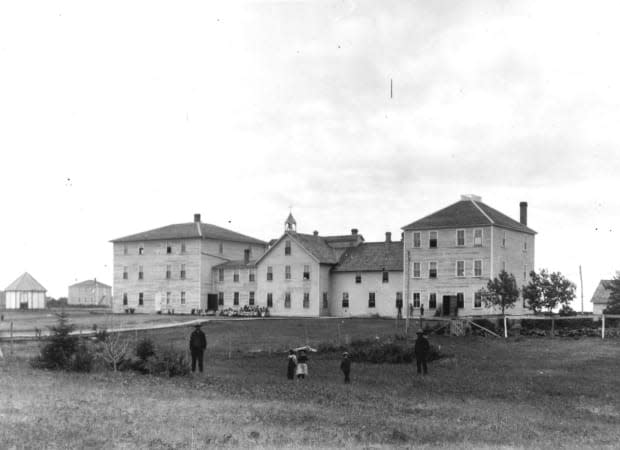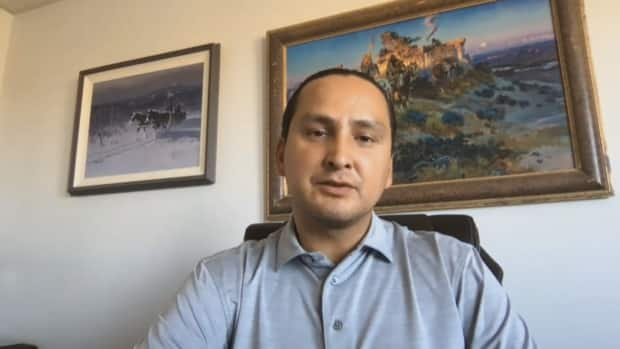'We are never going to go away': Sask. people come together for Orange Shirt Day
Saskatchewanians came together Tuesday to remember the impact of residential schools in Canada, in the name of reconciliation.
Sept. 30 is Orange Shirt Day, but the City of Saskatoon and Saskatchewan Diversity & Inclusion Network in Regina hosted their own events a day early so people could spend Wednesday how they wish.
"A lot of individuals across Canada have been involved in the work of reconciliation, and the idea that we need to recognize that residential schools really contribute in the form of historic legacy," Bradley Bellegarde, cultural diversity & Indigenous relations advisor for the City of Regina, said during a virtual event Tuesday.
"Even though there are a lot of bad stories, it's days like today that allow us an opportunity to be able to recognize that culture."
Residential schools were created by Christian churches and the federal government for the purpose of pulling Indigenous children from their communities and assimilating them into Euro-Canadian culture.
While some residential schools had opened in the 1830s, the residential school system was fully established after Canadian Confederation in 1867 and the implementation of the Indian Act in 1876. Most of the schools were in Western Canada and the northern territories.

More than 130 residential schools operated in Canada between 1831 and 1996, but the most operating at one time was 80 in 1931.
An estimated 150,000 children attended residential schools in Canada. Some students were physically and sexually abused at these institutions, and an estimated 6,000 died on their premises — although the true number is unknown because of incomplete records.
Many who survived were traumatized both by their experiences at school and by being disconnected from their homes.
"The whole purpose of residential schools was to take the savage out of the child… to take the Indigenous spirit out of the child," said Cowessess First Nation chief Cadmus Delorme, adding that some families in Saskatchewan had five generations attend these institutions.
"A lot of the challenges we see today in the justice system, the child welfare system, in unemployment — a lot of it stems back to some First Nations people still looking to reconnect with their spirit."

Delorme did not attend residential school, but his parents did. Despite his parents preaching to him and his nine older siblings that they ought to be proud of who they are, Delorme said could feel their trauma.
His father couldn't express his love toward his children, while his mother was overabundantly loving because she didn't have that growing up, he said.
"None of us listening created residential schools. None of us created the Indian Act. But we all inherited the aftermath together," said Delorme, whose reserve is located nearly 140 kilometres east of Regina.
Delorme listed three areas of focus that will help Indigenous people recover: economic self-sustainability, culture rejuvenation and political sovereignty.
"When we talk about truth, we've got to put down our ignorance, and stop being ignorant of our ignorance. We have to understand that there is a truth out there," he said.
"Once we know that truth, we have to change our behaviours… We owe it to our children, and our children yet unborn, to make sure that we can take things like Orange Shirt Day and just pause, and just see where we are in society, and then we can move forward."
Orange Shirt Day was created by Phyllis Webstad, a survivor of St. Joseph Mission Residential School in B.C., whose new bright orange shirt was stripped from her when she arrived at the institution in 1973.
Sept. 30 was chosen because that was the time of year children were taken from their homes and brought to residential schools, according to the Orange Shirt Day website.
Maria Linklater, a residential school survivor, is looking forward to Wednesday.
"Our parents didn't know how to parent us. We didn't know how to [be parents], and now it's hitting the other generations," said Linklater during a media event in Saskatoon Tuesday.
One memory from her time at the residential school stands out above the rest. Linklater used to look after a little boy named Frankie — she doesn't know his last name — until one day he disappeared. Linklater said she later saw a plane land on a nearby lake and saw people taking the boy away.
Frankie returned, but in a coffin, and was placed in the church, she said. A nun kept watch of the coffin there and the other students weren't allowed to visit, Linklater said, but she snuck into the church in the middle of the night.
"I opened the coffin and Frankie was all beaten up. His face was blue," Linklater said. "That little boy must have been one of the children that was beaten to death and never went home, and the parents never knew what happened to [him].
"If that happened to your grandchildren, what would you do about it? We are never going to go away."


